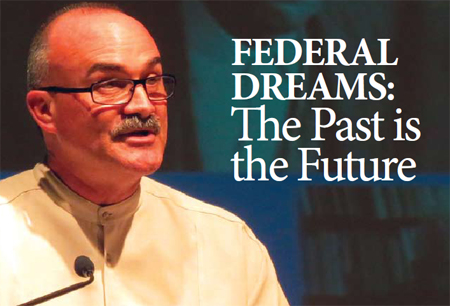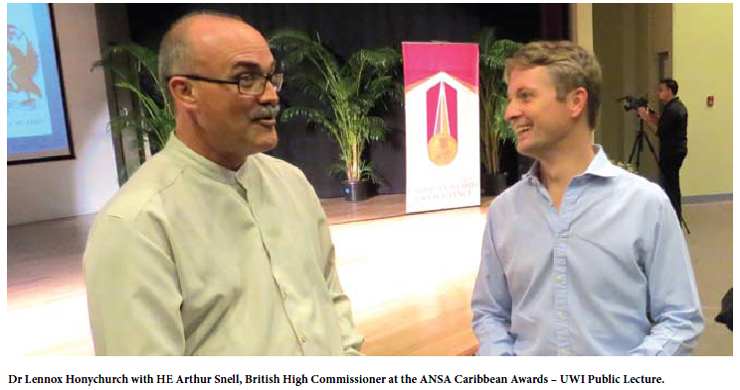 |
 |
 |
|
November 2012 |

The death of the Caribbean Federation half-century ago still echoes today, and many of the causes of its demise persist, said Dominican historian and anthropologist, Dr Lennox Honychurch. Dr Honychurch, the Anthony N Sabga Caribbean Awards for Excellence Laureate in Public & Civic Contributions for 2011, was delivering the third annual ANSA Caribbean Awards – UWI Public Lecture at the Learning Resource Centre on November 5. The idea and praxis of Caribbean federation has existed since the 18th century, said Dr Honychurch, but the first modern West Indian federal initiative was in 1932, at the Dominica Conference. The conference comprised 17 delegates, including Captain A.A. Cipriani of Trinidad, and unlike previous attempts, it was indigenously generated. And there was the element of the delegates having similar experiences of crown colony rule, and sharing a guiding philosophy Honychurch called “the spirit of the Enlightenment” – which meant a belief in progress, rationality, and science guiding human affairs. Despite its conveners’ enthusiasm, it was not until 1947 that the first official federation conference was held in Montego Bay. Federal Elections were held a decade later, in 1958, and Grantley Adams was elected the first Federal prime minister. But from the start, said Honychurch, “failure seemed to loom.” The issues included the choice of Lord Hailes, a British peer as governor general, and the site of the capital – whether Trinidad or Jamaica. And there were financial problems. The federal government had budget of a mere $9 million – less than the annual budget of the Port of Spain city council at the time, Honychurch said. Outside of the administrative woes, small-island insularity took a toll. Local affairs took prominence over federal affairs, and apathy among the masses in various islands grew. The conflicts peaked in Alexander Bustamante’s using the issue as a political weapon, and forcing Norman Manley to call referendum on the issue in Jamaica in 1961, which led to Jamaica’s withdrawal and Bustamante’s taking the Jamaican premiership. In 1962, after Eric Williams withdrew Trinidad and Tobago, the Federation died. It had lasted barely four years. Upon the breakup, said Honychurch, the political leaders of the Windward Islands and Barbados began discussions for a political union, the Little Eight, which became the Little Seven, when Errol Barrow withdrew because of the delays and vacillations of the others, and took Barbados to independence in 1966. By 1969, only Montserrat remained a colony, and the rest became associated states to Britain. In 1974, Grenada became the first associated state to acquire independence. Dominica in 1978, St Lucia and St Vincent in 1979, Antigua and Barbuda in 1981, and St Kitts and Nevis in 1983. In 1981, these islands formed the Organisation of Eastern Caribbean States, which remains the most successful model of Caribbean unity, unlike Caricom, which Honychurch described as an inefficient, unresponsive bureaucracy. As for the future of Federation, Honychurch was not optimistic. He identified several problems which inhibit federation, and which would make the exercise unworkable if enacted. Many issues persist from the early days, which include administrative inefficiency, insularity in smaller states, a “dumbing down” of the public, complemented by a growth in US materialism, and the decline of education. “There is a lot of talk about the ‘Singapore model’,” said Honychurch. “But it is the demand for efficiency that creates that model.” But things seemed to be moving in the opposite direction in the region. Honychurch pointed to the present decline of the Enlightenment idealism which characterized the generation the 1930s. This, he said, is accompanied by the growth of anti-scientific and anti-intellectual fundamentalist religions in all the islands which put political power into the hands of religious leaders. The decline of intellectual life had serious long-term consequences for the region and individual countries, primary among which are food security and energy needs.
A casualty of the new dispensation is The UWI, which can be of great assistance in addressing these issues, he said. But UWI is being starved of money as local governments divert their resources to local community colleges which grant degrees in conjunction with what he termed “thirdrate” US universities. To further frustrate the notion and effectiveness of Federation, said Honychurch, Caricom had become “an unwieldy bureaucracy which is swamped by a number of responsibilities on many levels.” This had generated “a tone of impatience with Caricom” among leaders like St Lucia Prime Minister, Kenny Anthony, and St Vincent Prime Minister, Ralph Gonzalves. He quoted Anthony as saying: “The Caribbean seems stalled at a crossroad of indifference,” so much so that it is becoming “out of step with the rest of the world.” In looking forward, Dr Honychurch offered a glimpse of optimism provided by the OECS which is more efficient than Caricom, and whose members share a currency and many other political and legal connections. “It is likely,” he said “that in coming years, we shall see a more rapid evolution of the OECS while the three larger entities, Jamaica, Guyana and Trinidad plod along.” (Raymond Ramcharitar) |

